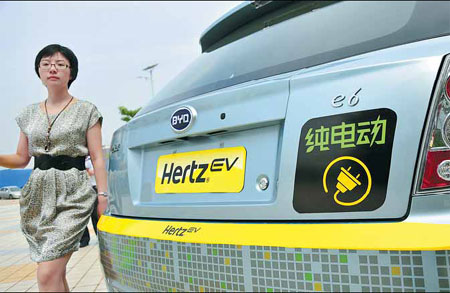
Analysts said the investment is more likely to boost Ehi's ambition than money raised from the stock market, due to a gloomy global financial environment. Moreover, the partnership will cover business development, knowledge transfer and strategic planning to leverage Enterprise Holdings' 55 years of success. Ehi's customers will also have worldwide access to the US company's portfolio of brands, including the international airports of Los Angeles, San Francisco and Vancouver.
 |
|
A woman with her rented electric car from Hertz Car Rental in Shenzhen. Beijing-based China Auto Rental now is the country's largest vehicle-leasing agency, measured by fleet size. The company has postponed its public listing in the United States. Yuan shuiling / for China Daily |
In exchange, Enterprise Holdings will offer Ehi's services to its business and leisure customers during their time in China, including in Beijing, Shanghai, Guangzhou and Shenzhen.
The deal could prove a challenge for China Auto Rental, the country's largest vehicle-leasing agency in terms of fleet size, and the only one offering services in every province and autonomous region.
Headquartered in Beijing, the company announced in January that it planned to raise $300 million to repay debts and buy vehicles through an initial public offering on the New Work Stock Exchange. Then, in April, the company revised its application to the US Securities and Exchange Commission, saying it had changed the destination to the Nasdaq.
China Auto Rental said it expected to offer 11 million American depositary shares at a price of $10.50 to $12.50 each.
However, the long-awaited IPO was suspended on April 25, on the eve of its planned listing day. According to its statement, the company said the suspension was to "avoid the shares falling on their debut", with concerns it might have to slash its price due to market turbulence.
"Under current market conditions, US investors cannot provide a fair and reasonable price for Chinese companies attempting to go public," the statement said. "The valuation by investors is not recognized by the company and its shareholders."
China Auto Rental also said that the 600 million yuan ($94.2 million) it had cash-in-hand was sufficient enough for daily operations, and it was also seeking "other windows of opportunity to restart the IPO".
Auto Rental News reported that China's vehicle-leasing industry is one of the fastest-growing markets in the world.
According to Roland Berger Strategy Consultants in Germany, the value of the car-rental market in China is expected to rise to $6.1 billion in 2015 (it was $2.5 billion in 2010), amid rapid urbanization and strong economic growth. Data also show that, since 2005, the value of the market has grown by about 30 percent year-on-year.
Although the rate of China's economy and automobile market slowed last year, Shen Jun of Roland Berger Greater China predicted that the segment will grow by 18 percent year-on-year until 2015, with the total fleet size set to double from 220,000 units last year to 430,000 units in 2015.
The potential comes from the fact China's car-rental fleet accounted for just 0.44 percent of the total passenger vehicle market last year, Shen said. The figure was 2.2 percent in Japan and 1.3 percent in the US in 2010.
"The expansion of China Auto Rental and Ehi will boost competition," Shen added.
By the end of last year, more than 10,000 car rental companies were operating in China, with an average fleet of no more than 50 units. The top five companies occupied 11 percent of the market.
However, Shen said the industry leaders' rate of growth is much faster than the market growth.
"The industry should be led by several big groups, which operate major business in local markets," Shen said. "National regulations are urgently needed for the industry to ensure sound development."
China's car-rental industry experienced takeoff in 2010, when some leading companies received investment, enabling them to expand.
That year, China Auto Rental received 1.2 billion yuan from Legend Holdings, parent company of PC maker Lenovo Group, which helped the leasing company expand its fleet from 6,000 to about 26,000 units last year, almost four times the number owned by its biggest rival.
China Auto Rental now owns 25,845 vehicles with a network of 520 service locations in 66 cities. Lu Zhengyao, its president, said the company aims to have 100,000 units in 2015.
Also in 2010, Ehi received $70 million from a consortium, led by Goldman Sachs. It also used the money to expand its fleet and presence throughout China. Today, the company operates a fleet of more than 7,600 vehicles and serves both individual and corporate customers at 383 locations in 48 cities.
Another company, Qiangsheng Holding Co Ltd, raised money in 2010 to buy assets from its two largest shareholders, Shanghai Qiangsheng Group Co Ltd and Shanghai Jiushi Corp.
After selling about 245 million shares in a private placement with a capitalization of 1.72 billion yuan, the Shanghai-listed company bought its investors' taxi operations, car-rental services and travel businesses.
lifangfang @chinadaily.com.cn







